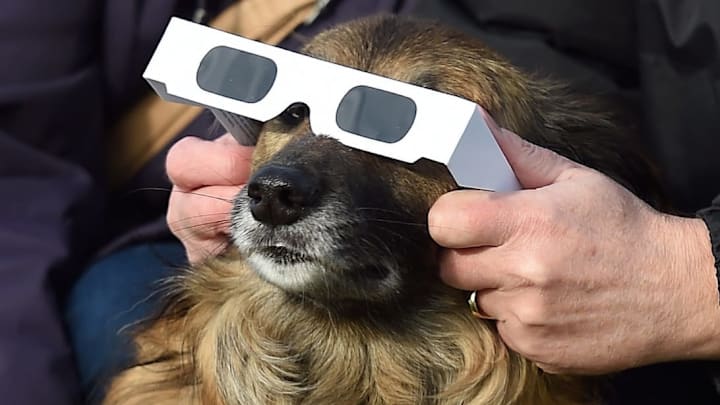By now, you probably know what you’ll be doing on April 8, 2024, when the Great North American total solar eclipse makes its way across the continental United States. You’ve had your safety glasses ready since January (and have confirmed that they’ll actually protect your retinas), you’ve picked out the perfect vantage point in your area for the best view, and you’ve memorized Nikon’s tips for taking pictures of this rare celestial phenomenon. Still, it feels like you’re forgetting something … and it’s probably the thing that's been right under your nose, and sitting on your lap, the whole time: your pets.
Even if you’ve never witnessed a solar eclipse, you undoubtedly know that you’re never supposed to look directly at the sun during one. But what about your four-legged family members? Shouldn’t Fido be fitted with a pair of eclipse glasses before he heads out for his daily walk? Could Princess Kitty be in danger of having her peepers singed if she’s lounging on her favorite windowsill? While, like humans, looking directly at the sun during a solar eclipse does pose the potential of doing harm to a pet’s eyes, it’s unlikely that the thought would even occur to the little balls of fluff.
“It’s no different than any other day,” Angela Speck, co-chair of the AAS National Solar Eclipse Task Force, explained during a NASA briefing in June 2017, just before of the last total solar eclipse in North America. “On a normal day, your pets don’t try to look at the sun and therefore don’t damage their eyes, so on this day they’re not going to do it either. It is not a concern, letting them outside. All that’s happened is we’ve blocked out the sun, it’s not more dangerous. So I think that people who have pets want to think about that. I’m not going to worry about my cat.”
Dr. Jessica Vogelsang, a veterinarian, author, and founder of pawcurious, echoed Speck’s statement, but allowed that there’s no such thing as being too cautious. “It’s hard for me to criticize such a well-meaning warning, because there’s really no harm in following the advice to keep pets inside during the eclipse,” Vogelsang told Snopes in 2017. “It’s better to be too cautious than not cautious enough. But in the interest of offering a realistic risk assessment, the likelihood of a pet ruining their eyes the same way a human would during an eclipse is much lower—not because the damage would be any less were they to stare at the sun, but because, from a behavior standpoint, dogs and cats just don’t have any interest in doing so. We tend to extrapolate a lot of things from people to pets that just doesn’t bear out, and this is one of them.
“I’ve seen lots of warnings from the astronomy community and the human medical community about the theoretical dangers of pets and eclipses, but I’m not sure if any of them really know animal behavior all that well," Vogelsang continued. "It’s not like there’s a big outcry from the wildlife community to go chase down coyotes and hawks and bears and give them goggles either. While we in the veterinary community absolutely appreciate people being concerned about their pets’ wellbeing, this is a non-issue for us.”
The bigger issue, according to several experts, would be with pets who are already sensitive to Mother Nature. "If you have the sort of pet that's normally sensitive to shifts in the weather, they might be disturbed by just the whole vibe because the temperature will drop and the sky will get dark,” Melanie Monteiro, a pet safety expert and author of The Safe-Dog Handbook: A Complete Guide to Protecting Your Pooch, Indoors and Out, told TODAY in 2017.
“If [your pets] have learned some association with it getting darker, they will show that behavior or at a minimum they get confused because the timeframe does not correspond,” Dr. Carlo Siracusa of Penn Vet Hospital told CBS Philly in 2017. “You might put the blinds down, but not exactly when the dark is coming but when it is still light.”
While Monteiro confirms that “dogs and cats don't normally look up into the sun, so you don't need to get any special eye protection for your pets,” she says that it’s never a bad idea to take some extra precautions. So if you’re headed out to an eclipse viewing party, do your pets a favor and leave them at home. They won’t even know what they’re missing.
Read More Stories About Pets:
A version of this story originally ran in 2017; it has been updated for 2024.
